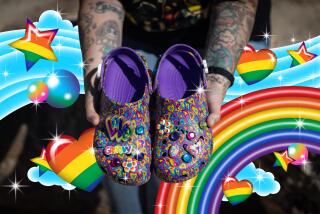The Woman Who Changed the Face of School Fund-Raising
- Share via
DUNCAN, S.C. — If you have school-age children, or you live next door to some, chances are you’ve got a few rolls of glossy Sally Foster wrapping paper or curly bows or gift bags stuck in a drawer or closet, ready for this weekend’s holiday wrapping binge.
The Foster line is sold every fall in fund-raising drives at 8,000 public, private and parochial schools nationwide.
Across the country, 3 million Sally Foster catalogs full of bright photos of paper, ribbons, chocolates and gifts went home in kids’ backpacks early this school year, in time to catch the wrapping-intensive holiday market. And the schools, in return, will reap a windfall: 50% of every sale.
The founder of the 30-year-old company, with offices here in the foothills of the Blue Ridge Mountains, came up with a win-win formula: a quality product, sold for a good cause to a captive audience.
“We give the consumer something they want and something that is a great design on great paper,” says Foster, 62, who lives in nearby Spartanburg. “The bonus is that it benefits the schools.”
This year, the company sold $100 million worth of wrapping paper and related products. It’s a small but growing part of the industry: Gift wrap is about a $3 billion business in America today, according to a spokeswoman for Hallmark Cards, a leading producer of gift wrap.
But Foster targets a niche market, selling only through schools and other nonprofits. The company also insists on top quality, with paper that’s about 30% heavier than that found at discount stores and drugstores. Designs are changed each year, for Christmas, Hanukkah, birthdays and all-occasion paper. (Most of Sally Foster’s 2-foot-wide rolls cost $7 to $10 and contain 20 to 40 square feet per roll, making it competitive with other upscale retail wraps.)
The niche has proved to be a profitable one, as schools across the country look for creative fund-raising tactics to augment tight budgets: auctions, bake sales, book fairs and carwashes. One of the most popular activities is door-to-door sales. According to Vickie Mabry at the Assn. of Fund-Raising Distributors and Suppliers, $1.5 billion is raised each year by students selling products such as cookie dough, pizza-making kits and citrus fruit. But the big three, in no particular order, are magazines, candy and wrapping paper.
Few parents look forward to the annual sell-a-thon and the pressure to hit up relatives, neighbors and co-workers. But Foster figured that practical, quality products would encourage parents to buy it themselves and ease their reluctance to ask family and friends to pitch in as well.
“I remember the awful things we used to have to sell for our kids’ schools,” said Foster, walking through the cavernous 197,000-square-foot distribution center, where a Weber bag converter churns out a steady stream of folded gift bags. “Fertilizer, pumpkins, even horrible Styrofoam Santas. Everyone needs wrapping paper, and you can feel good about selling it.”
In this plant, and another in Colorado Springs, millions of individual student orders are assembled in sturdy rectangular boxes and shipped back on pallets to the schools for distribution. A refrigerated (and locked) room full of Harry London chocolates here keeps the Peanut Butter Buckeyes and Almond Bark candies from melting. One machine manufactures cardboard tubes while another spits out finished rolls to an employee who slips them into plastic bags. The company has come a long way since the early days when Foster and a crew of volunteer moms assembled materials around a pool table in her den.
Foster, who grew up in Greenville, S.C., was 19--and already married--when she graduated from Duke University in 1958 with a degree in psychology. Her husband, Philip Foster, was in the retail packaging business, selling bags, boxes and gift-wrap supplies.
Before long the couple had three children, and Sally, looking for some way to pick up extra money for their summer camps, decided to try selling some of her husband’s wrapping paper. “I started inviting people over, and soon I was selling it to my 200 closest friends,” she said.
In 1970, the family moved to the Atlanta area, where Foster became active in her children’s school--one of the tireless volunteer parents, then almost entirely moms--working to raise money. She recalls trying to get kids and parents to peddle glitter candles and apples. “We need to find something to sell that we don’t have to apologize for selling,” she said to her fellow volunteers, and told them about her earlier success with wrapping paper. Soon the crew was gathering in the school cafeteria cutting paper from huge industrial rolls in 50-foot lengths and rolling them on cardboard tubes. “It changed fund-raising forever,” Foster said.
In 1973, the family moved back to Spartanburg and Foster decided to launch a business based on her experience. She started with three schools and only red or green gift wrap. Gradually, through her husband’s contacts, she started working directly with manufacturers, improving the quality of the product, insisting on thick paper and expert printing.
She says she never tried to draw her designs, but that she has a great eye for color and pattern and has always liked collaborating with manufacturers to tailor designs for her market. “Everything influenced me,” she said. She showed the designers things like skirts, ties and ribbons that reflected design directions she wanted to go in.
As word of the fund-raising successes spread, the company started to expand. In 1982, after the death of a son, her husband joined the company. “It was difficult for us to be apart,” she said, “and seemed like a good way to grow the business.”
By 1989, the Sally Foster company had about 2,500 accounts coast to coast, but it had outgrown its production facilities and needed an infusion of capital to modernize. About this time, too, her husband began having health problems. So when a neighbor, Bill Moore, offered to buy the business with his father, they decided it was time to sell. Foster won’t say exactly for how much, only that it was “several million dollars.”
As part of the deal, the brand name remained and the Fosters stayed on as consultants, a role they continue to this day. The Moores added other investors and took the company public. Then Sally Foster was sold again in 1992--this time for $31 million--to Entertainment Publications of Troy, Mich., a marketer of coupon books and merchant discount programs. In the ‘90s, the product line expanded to include chocolates, candles and ornaments.
In 1999, Entertainment Publications and Sally Foster became an investment in the portfolio of the Carlyle Group, a Washington-based global private-equity firm better known for investments in aerospace, defense and technology than wrapping paper decorated with smiling snails and holographic Christmas trees.
Despite the current economic downturn, the company said sales increased 10% this year.






